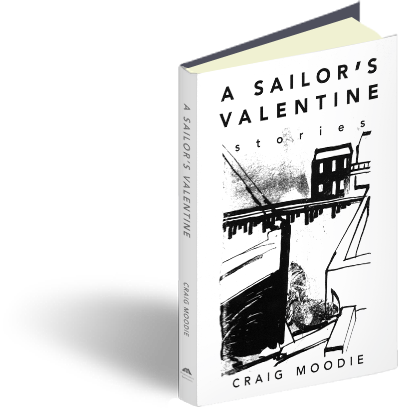
A Sailor's Valentine
Set in the waterways and towns of Cape Cod, Moodie’s collection of 13 contemporary sea stories about commercial fishermen is an impressive debut. Populated with men “partial to whiskey, hard weather, and mermaids,” many of these tales juxtapose relationships with women against the love of the sea. In “Harwich Port,” a young seaman moves between his girlfriend and his search for offshore work. When a wife of 50 years reveals to her husband that she’s in love with someone else in “Noon,” the husband turns to the sea for solace. Tradition and superstition motivate several characters: in “The Ropes,” a son leaves for Colorado hoping to return a better man in his father’s eyes; in “The Dream of the Whistling Pig,” a man, frightened about revealing a dream of capsizing in his boat, awakens to realize he is experiencing his own nightmare. Only the title story is cliched and cloying—it concerns a young seaman yearning for a girl from the city. Moodie is an expert at building suspense, however; the finest stories are “Report from Pollock Rip,” a gripping rescue yarn, and “Child in the Shoals,” a spellbinding tale in which a lobsterman, cast overboard and clinging to a bell buoy while waiting to be rescued, is befriended by a blind gannet.
Copyright © 1994 Reed Business Information, a division of Reed Elsevier Inc.
A debut collection of stories about the sea, A Sailor’s Valentine is a mix of contemporary romantic tales and ocean adventures that are alternately moving, mysterious, melodramatic, and mawkish. In the opening piece, “The Dream of the Whistling Pig,” a man dreams he is thrown overboard, only to awaken to find that his unconscious fantasy has become a reality for his missing shipmate. More conventional is the title story, in which a woman from Manhattan falls in love with a fisherman on Cape Cod but must return to her slick city life after the summer is over. With a plot that is cliched and sentimental and characters that are too broadly drawn, the reader ultimately doesn’t care whether these two end up together. Truly affecting, however, is “Child in the Shoals,” the story of a man whose boat is destroyed in a collision with a 523-foot ship and who must literally cling to life by holding on to a buoy while he waits to be rescued. The explicit details of the man’s struggle for survival—he eats bird excrement—and his poignant and hallucinatory thoughts of his family make this piece a heart-wrenching read. On an even more existential note, there’s the Melvillian “The Shearwater,” perhaps the finest story in this collection, in which an old fisherman goes out to sea on just another routine fishing expedition and is pursued through the fog—and on the radar—by an omniscient force that threatens to collide with his boat and kill him. Moodie is a skillful, if somewhat formulaic writer, and his stories are rarely dull. The author relies too often on technical jargon, however, as if to lend his work a loftiness that it otherwise lacks.
Copyright © 1994 Kirkus Associates, LP. All rights reserved.